| Srl | Item |
| 1 |
ID:
106569
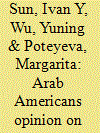

|
|
|
|
|
| Publication |
2011.
|
| Summary/Abstract |
While domestic and international terrorism have become the focal concern of the U.S. law enforcement and intelligence agencies, little is known about Arab Americans' attitudes toward counterterrorism policies that center on aggressive law enforcement practices. Using survey data collected from 810 Arab Americans, this study reported the general pattern of support for antiterrorism measures, including surveillance, stop and search, and detention, and examined the effects of race, ethnicity, and religion on measures targeting the U.S. citizens generally and Arab Americans specifically. The results revealed that the majority of Arab Americans showed weak to modest support for aggressive law enforcement practice, especially those targeting Arab Americans. Arab Americans' attitudes toward antiterrorism measures were significantly related to their ethnic identities and religion with those who identified themselves as Arab Americans and Muslim showing less favorable attitudes toward counterterrorism measures. Arab Americans' confidence in the federal government was also found to be positively associated with support for antiterrorism practices. Implications for research and policy are discussed.
|
|
|
|
|
|
|
|
|
|
|
|
|
|
|
|
| 2 |
ID:
116231
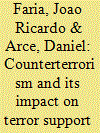

|
|
|
|
|
| Publication |
2012.
|
| Summary/Abstract |
This article presents a dynamic model in which counterterrorism policies have the potential to generate positive public support for terrorism via a backlash that may fuel terror recruitment. For an optimizing government aiming at maximizing security, this phenomenon produces a natural bound on proactive counterterror policy that is related to the dynamic path of conflict. Moreover, terror is a persistent phenomenon that requires patience on the part of the target government for optimal counterterror policies to be realized. Finally, the potential for backlash yields insights into the need for target governments to fight an information war to change public opinion regarding its own policies and the ultimate effect of terror attacks.
|
|
|
|
|
|
|
|
|
|
|
|
|
|
|
|
| 3 |
ID:
151983
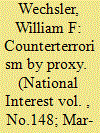

|
|
|
|
|
| Summary/Abstract |
ONE OF the few things that Presidents George W. Bush and Barack Obama have in common is that they reversed their long-standing approaches to counterterrorism during their very last years in office. They initially held diametrically opposed military policies, with Bush choosing invasion and occupation and Obama preferring disengagement and drone strikes. But by the end of their second terms they had both ended up in roughly the same place, with a central focus on indirect action—enabling local forces to achieve U.S. counterterrorism objectives.
|
|
|
|
|
|
|
|
|
|
|
|
|
|
|
|
| 4 |
ID:
116182
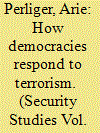

|
|
|
|
|
| Publication |
2012.
|
| Summary/Abstract |
While the academic study of counterterrorism has gained momentum in recent years, it still suffers from major theoretical weaknesses. One of the most prominent shortcomings is an absence of theories that can effectively explain the factors that shape the counterterrorism policies of democratic regimes. The present study attempts to fill this theoretical void in two ways. First, it proposes an analytical framework for a classification of counterterrorism policies. Second, it presents a theoretical framework that strives to uncover the factors that have influenced the struggle against domestic terrorism in democratic regimes. The analyses, which have used a unique and comprehensive dataset that documents counterterrorism policies in eighty-three democracies, show that the robustness of the regime's democratic foundations as well as the symbolic effect of terrorism are major forces in shaping the democratic response to it, while the direct impact of terrorism is less influential than assumed in the literature.
|
|
|
|
|
|
|
|
|
|
|
|
|
|
|
|
| 5 |
ID:
087818
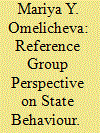

|
|
|
|
|
| Publication |
2009.
|
| Summary/Abstract |
For over a decade Estonia has been untouched by terrorist violence. However, notwithstanding the lack of a viable terrorist threat, the Estonian government adopted extensive counterterrorism measures. What explains the scope of Estonia's counterterrorism measures? The main proposition of this article is that the content of states' counterterrorism policies is shaped by the types of responses adopted by their reference groups. The evidence examined in the study demonstrates that Estonia's primary reference groups, NATO and the EU, have influenced the republic's counterterrorism programme. An unattractive target to terrorists, Estonia adopted broad counterterrorism responses to defend indivisible Euro-Atlantic security and to protect democratic values that terrorists attempt to destroy.
|
|
|
|
|
|
|
|
|
|
|
|
|
|
|
|